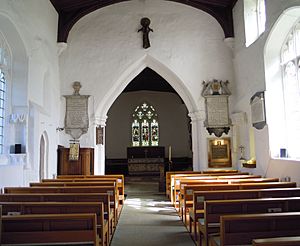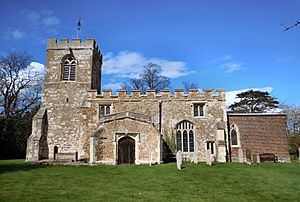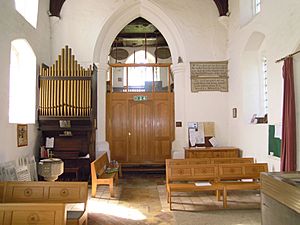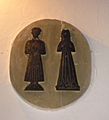Church of St Nicholas, Hinxworth facts for kids
The Church of St Nicholas is an old and important church in the village of Hinxworth, Hertfordshire. It's a Church of England parish church, which means it serves the local community. Most of the church was built in the 1300s, making it very historic! It's also a Grade II* listed building, which means it's a special building protected for its history and architecture. The church is part of the Diocese of St Albans.

Contents
History and Design of the Church
The Church of St Nicholas is named after Saint Nicholas. It was likely built on the spot of an even older church. However, old records like the Domesday Book don't mention a priest in Hinxworth.
Most of the church, including its tall West tower and the main part called the nave, was built in the 1300s. Some changes were made in the 1400s. These parts are made from flint stone with special clunch stone decorations. The tower has two levels and strong supports called buttresses. It also has a battlemented top, which looks like the top of a castle wall.
The chancel, which is the area near the altar, was rebuilt around 1830. This part is made of red brick with stone patterns. The South porch, which is the entrance, was added in the 1400s and has a pointed roof called a gable.
Inside the Church
The main part of the church, the nave, does not have side aisles. Its roof was added in the late 1800s and is supported by four carved wooden corbels from the 1400s.
You can find two interesting canopied niches inside. One is by a North window, and the other is in the south-east corner of the nave. Next to the north window, there's a spiral staircase from the 1300s. It's now blocked at the top, but it used to lead up to a rood screen, which was a decorative screen that separated the nave from the chancel.
The arch leading to the chancel was first built around 1350. It was later changed in the 1440s. The upper part of the nave walls, called the clerestory, was made taller at the end of the 1400s. A new, flatter roof was then put on top. The chancel has a ceiling with panels and simple decorations. The beautiful stained-glass windows in the church were put in during the mid-1800s.
Special Features and Bells
The church has some unique items. You can see two special metal plaques, called monumental brasses, in the chancel. One is high on the north wall and is from the mid-1400s. It's thought to show Simon Ward, who died in 1453, and his wife, who died in 1481.
Another brass on the floor shows a man, a woman, and six children. This is believed to be John Lambard, an important person from London who died in 1487. One of his daughters was supposedly Elizabeth, who was connected to King Edward IV of England.
The pulpit, where the priest gives sermons, is from the mid-1700s. Nearby is a chair for the Rector (the head priest) from the 1500s or early 1600s. The small, eight-sided baptismal font near the west end of the church is from the mid-1800s.
The Church Bells
The Church of St Nicholas has six bells!
- The smallest bell (treble) was made in 1908.
- The second bell was made by John Briant of Hertford in 1820.
- The third and fourth bells were made by Miles Graye in 1651.
- The fifth and largest bells (tenor) were also made by John Briant in 1825 and 1820.
These bells and the church tower were repaired and made new between 1981 and 1986. Money for this important work came from a BBC Radio Appeal. The appeal was supported by the famous author Monica Dickens, who used to live in Hinxworth. Funds were also raised by a group called the Friends of the Church.
The Church of St Nicholas has been a Grade II* listed building since May 1968, showing its historical importance.
Gallery
-
The 19th century baptismal font
 | Selma Burke |
 | Pauline Powell Burns |
 | Frederick J. Brown |
 | Robert Blackburn |






